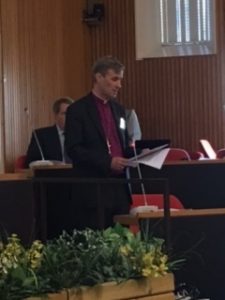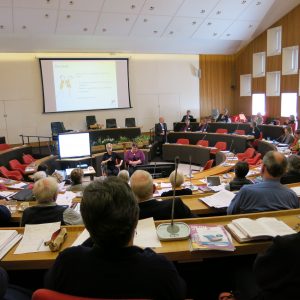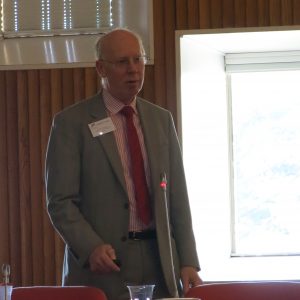Bishop Tim: we need to confront our fears in order to truly flourish
The Bishop of Truro has exhorted people to face their fears, especially their fear of failure, in order to be able to truly flourish.
During a frequently self-deprecating, final presidential address to the Diocesan Synod, the Rt Rev’d Tim Thornton said we could all benefit from asking difficult questions of ourselves and focusing on our relationships with one another, and with God.
During his speech in the council chamber at County Hall, Truro, Bishop Tim focused on the apparent impossibility of being able to communicate with clear and unequivocal messages.
Bishop Tim said: “I have failed and I want to confess that, here, in this synod. I have failed in many ways in my time as bishop … The way that is foremost in my mind is that I am all too aware that I have not communicated well what I wanted to say. I think I know what I am saying but somehow other people hear something very different.
“For example, I think I have said something stern and difficult and other people think they have had an encouraging meeting. Or, I think I am being nice and pastoral, and people go away feeling they have been ticked off.
“On a wider scale it is clear, and you will hear this as a theme running through this synod, that I have failed as your bishop in communicating some of the essential messages in this diocese. So for example, still people seem to believe there is a cupboard somewhere in Truro full of strange people whose life’s work is to devise ways in which ‘the diocese’, whatever that is, can ask more and more, in particular more money of parishes with no explanation why or on what the money will be spent.
“Or, still people believe there is a magic tree on which grows wonderful priests, all of whom want to come and work in Cornwall, and somehow I am preventing them from coming here.
“Or again, still people believe if only we get our structures right, by which they often mean turning the clock back to a previous system, then all our problems will be solved.
“Or yet again, still people believe it is all ‘their’ fault – insert any number of people or groups into the word ‘their’ – and if only ‘they’ (whoever they are) would recognise it then everything would be alright.
“This failure of mine to communicate is not confined to myself – I suggest it is a widespread, if not universal issue.”
“What do I want to encourage you to do and to hear, as we meet for this Synod and have the wonderful, awesome opportunity to consider how we affect the discipleship of each other? Yes, I want God’s people to be set free but that will not happen through layers of meetings and acres of reports.
“I believe we need to focus on our relationship with God and our relationships with each other. In doing so we have to begin and continue asking the very intimate, hard and complicated question of ourselves – of what are we afraid and why. Dare we allow ourselves to live our lives so that we flourish and celebrate the amazing wonder of being loved by God, accepting that God believes in me and you and knowing that Christ is alive?”
The communications theme was also picked up by Mike Sturgess, chair of the Truro Diocesan Board of Finance, as he presented his report to the synod.
He said: “Communication is our biggest problem, and people do hear what they want to hear. Also, by the time the Chinese whisper gets out it is very different from what you wanted to say, so it is very difficult to get the right message across.”
The synod also heard from Peter Rand, MBE, vice chairman and trustee of Friends of The Holy Land, from Jonathan Rowe, the diocese’s director of ministry, and from the director of education and discipleship, Simon Cade.
Bishop Tim was later taken to task for suggesting he had failed in any way by the Dean of Truro, Roger Bush.
Dean Roger said: “He knows that he is a disciple of Jesus Christ. He is that first and foremost and everything from his ministry flows from that.
“He leaves us as a more reflective, nature and responsive church, one with many of those questions still echoing around this chamber, but that is a necessary, healthy reflection of who we are as a church.”
As Roger offered thanks to Bishop Tim for his leadership on behalf of the synod, its members rose in a standing ovation.



